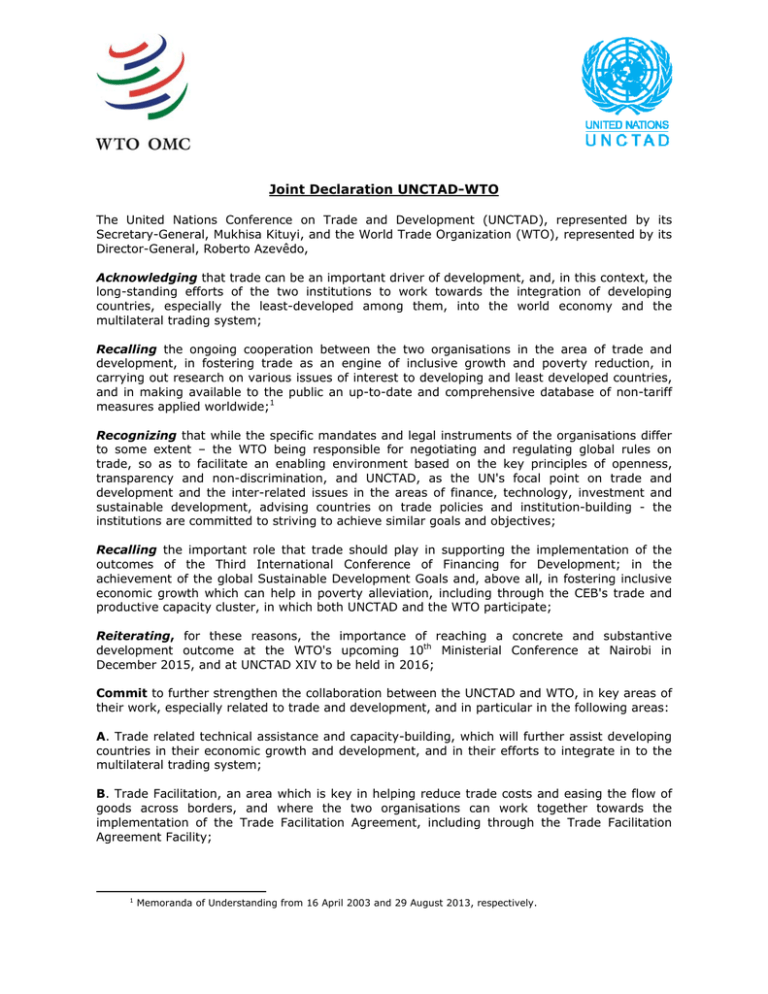Joint Declaration UNCTAD-WTO
advertisement

Joint Declaration UNCTAD-WTO The United Nations Conference on Trade and Development (UNCTAD), represented by its Secretary-General, Mukhisa Kituyi, and the World Trade Organization (WTO), represented by its Director-General, Roberto Azevêdo, Acknowledging that trade can be an important driver of development, and, in this context, the long-standing efforts of the two institutions to work towards the integration of developing countries, especially the least-developed among them, into the world economy and the multilateral trading system; Recalling the ongoing cooperation between the two organisations in the area of trade and development, in fostering trade as an engine of inclusive growth and poverty reduction, in carrying out research on various issues of interest to developing and least developed countries, and in making available to the public an up-to-date and comprehensive database of non-tariff measures applied worldwide;1 Recognizing that while the specific mandates and legal instruments of the organisations differ to some extent – the WTO being responsible for negotiating and regulating global rules on trade, so as to facilitate an enabling environment based on the key principles of openness, transparency and non-discrimination, and UNCTAD, as the UN's focal point on trade and development and the inter-related issues in the areas of finance, technology, investment and sustainable development, advising countries on trade policies and institution-building - the institutions are committed to striving to achieve similar goals and objectives; Recalling the important role that trade should play in supporting the implementation of the outcomes of the Third International Conference of Financing for Development; in the achievement of the global Sustainable Development Goals and, above all, in fostering inclusive economic growth which can help in poverty alleviation, including through the CEB's trade and productive capacity cluster, in which both UNCTAD and the WTO participate; Reiterating, for these reasons, the importance of reaching a concrete and substantive development outcome at the WTO's upcoming 10th Ministerial Conference at Nairobi in December 2015, and at UNCTAD XIV to be held in 2016; Commit to further strengthen the collaboration between the UNCTAD and WTO, in key areas of their work, especially related to trade and development, and in particular in the following areas: A. Trade related technical assistance and capacity-building, which will further assist developing countries in their economic growth and development, and in their efforts to integrate in to the multilateral trading system; B. Trade Facilitation, an area which is key in helping reduce trade costs and easing the flow of goods across borders, and where the two organisations can work together towards the implementation of the Trade Facilitation Agreement, including through the Trade Facilitation Agreement Facility; 1 Memoranda of Understanding from 16 April 2003 and 29 August 2013, respectively. C. Global Value Chains, especially in addressing the challenges that many developing countries face in integrating and upgrading in global and regional value chains in both goods and services trade; D. Standards, especially in the areas of Sanitary and Phytosanitary Measures (SPS) and Technical Barriers to Trade (TBTs); and further co-operation between the Standards and Trade Development Facility and UNCTAD; E. Non-tariff Measures, strengthening co-operation on the NTM data base, especially in the area of classification and compilation of tariff information and trade databases; F. Research in all areas of trade and development, including further cooperation in building the "Geneva Trade Statistics Hub"; G. Trade and investment, and trade, debt and finance, not least in ensuring that trade, including trade finance especially for micro, small and medium enterprises, plays its role as an engine for inclusive growth and poverty reduction; H. Least-developed countries, especially helping them take advantage of duty-free, quota-free schemes and assisting them in the area of rules of origin, supporting them to benefit from the LDC Services Waiver, assisting them in making more use of electronic commerce, taking advantage of targeted assistance in initiatives such as the Enhanced Integrated Framework and Aid for Trade; I. Commodities, including enhanced cooperation and participation in UNCTAD's Global Commodities Forum, and in the Pan African Cotton Roadmap; J. Electronic commerce, and especially the challenges and opportunities for the least-developed and developing countries to use the internet and e-commerce to develop their international trade capacities; K. UN's Sustainable Development Goals, especially in tracking progress with meeting the SDG indicators and targets, and thereby continuing the solidarity developed during the work on the finalization of the SDGs. The Director-General and the Secretary-General confirm that their respective Secretariats will strengthen their collaboration in the aforementioned areas of work and that this Joint Declaration, which does not commit either organization to any financial obligation, is subject to the procedures, rules and regulations of the respective institutions. Nothing in this Joint Declaration shall be construed as interfering with the respective mandates and decision-making authority of each institution. Roberto Azevêdo Director-General, WTO Mukhisa Kituyi Secretary-General, UNCTAD Signed in Geneva on 12 October 2015, in two original copies

